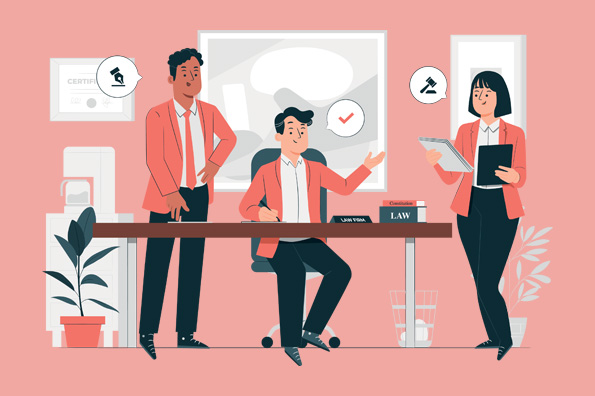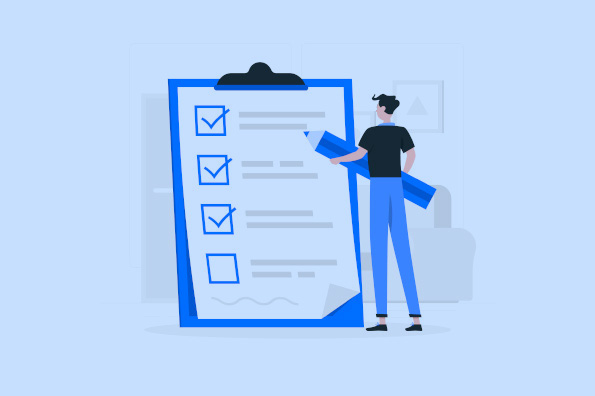4 Must-Have Business Licenses and Permits Every Business Owner Needs
 Chris Daming, J.D., LL.M. : Oct. 5, 2024
Chris Daming, J.D., LL.M. : Oct. 5, 2024
Most businesses require at least one type of license or permit, whether they know it or not. But, if you “don’t know what you don’t know,” you might not know what applies.


Legal GPS Pro
Protect your business with our complete legal subscription service, designed by top startup attorneys.
- ✅ Complete Legal Toolkit
- ✅ 100+ Editable Contracts
- ✅ Affordable Legal Guidance
- ✅ Custom Legal Status Report
Here’s an extreme example: if a parent and child are operating a lemonade stand, they could need:
- A business license to conduct business in their city;
- A local permit to sell lemonade on the sidewalk;
- A health permit that ensures they’re operating a healthy food and beverage service; and
- A seller’s permit that allows them to collect sales tax.
(That’s a slippery slope because there are a lot more legalities we left out to not bore you, but you get the idea).
Of course, most likely there’s no government official that would be that big of a monster to enforce the laws in that scenario, but it gives you an idea how a lot of different legalities could apply to your business. And so you don’t get too nervous, most of these licenses and permits won’t apply. But it’s worth learning about them all to be safe.
Let's go through the 4 most common licenses and permits.
Do You Need a Business License?
A business license is a license that some type of governmental entity requires you to get before you operate your business. Just like how you need a license to drive a vehicle, fly a plane, or sell liquor at a bar, most cities or municipalities require you to get a license to conduct business in their area. Here’s an example from one city: “Any person who engages in any business, occupation, pursuit, profession, calling, avocation, or trade within the City Limits is required to have a business license.”
Do you Need Any Specialty Licenses or Permits?
Depending on your industry and state, you may be required to obtain a Specialty License. Specialty licenses allow states to heavily regulate certain products and must be in place to protect the safety of consumers. If you sell a product or a service, you need to identify the regulating agency and determine if a special license is required beyond a typical business license.
If your business involves any of the following products or services, you’ll need to determine whether a Specialty License is required:
|
|
Whether you run a boutique online store selling homemade children’s pillows or multiple restaurants serving a myriad of dishes, you will need to comply with the mandated permits and licenses.


Legal GPS Pro
Protect your business with our complete legal subscription service, designed by top startup attorneys.
- ✅ Complete Legal Toolkit
- ✅ 100+ Editable Contracts
- ✅ Affordable Legal Guidance
- ✅ Custom Legal Status Report
Federal Specialty Licenses
There’s a lot of federal licenses you might not think about that could apply to your business. If you don’t get the license or certification you need, it could cause serious problems for your business--regardless if it were an accident or not.
The easiest first step is to Google your type of business or product and “required licenses,” “federal regulations,” and “federal laws.” For example, if you were creating a type of lawn mower, you’ try “lawnmower required licenses,” “lawnmower federal regulations,” and “lawnmower federal laws.”
Also, if you’re in a specific field, chances are you know others in that field. Ask them, especially people that have been in that field for awhile. In could save you a lot of trouble.
Finally, check out this helpful SBA link to see if anything applies.
Specialty License Example
Will had a company that sold a product, Sales 4 Kidz. The product was a game for children that taught them how to be better salespeople. William started by selling the product to friends and family and a few local daycare centers. One of the children from the daycare center who was playing the product started choking on one of the money pieces and his parents sued Will and his LLC for negligent design of the product.
The Consumer Product Safety Commission, a federal agency, found out about all of this and sued Will as well for failing to comply with the requirements necessary for children’s games. Then Will’s city and state, Saint Louis and Missouri, found out Will hadn’t collected sales taxes and sued Will for back taxes and punitive fees. All these agencies could do this because Will was selling goods that needed to comply with the CPSC and needed to collect sales taxes when he sold his product.
Do Need a Public Safety Permit?
A public safety permit is required by certain businesses and events to ensure the safety of the public. These permits are typically issued by local government agencies and are necessary for businesses and events that pose potential risks to the public. Examples of businesses that may require a public safety permit include amusement parks, fireworks displays, and outdoor festivals.
The most common safety permits are:
- Health
- Fire
- Building
- Zoning
Not obtaining required Public Safety permits could cost you thousands in fines and penalties and ruin your company. Your business’ reputation and goodwill are directly linked to your protection of your customers. Additionally public safety permits are necessary to protect the general public. You can learn more on our post about Public Safety Permits.
Do you need a seller's permit?
If you sell goods or services, you may need a Seller’s Permit. This is required by law.
Without a seller’s permit, you won’t be able to collect sales taxes in states that require you to do so. But, you’ll still be required to pay the sales tax. This means you’ll be paying from your own pocket and not from the sales tax you could be collecting. Your company could also face additional fines and penalties.
Check out our guide to seller's permits and sales taxes to learn more.
Do I need a business lawyer?
The biggest question now is, "Do I need a business lawyer?” For most businesses and in most cases, you don't need a lawyer to start your business. Instead, many business owners rely on Legal GPS Pro to help with legal issues.
Legal GPS Pro is your All-In-One Legal Toolkit for Businesses. Developed by top startup attorneys, Pro gives you access to 100+ expertly crafted templates including operating agreements, NDAs, and service agreements, and an interactive platform. All designed to protect your company and set it up for lasting success.

Legal GPS Pro
Protect your business with our complete legal subscription service, designed by top startup attorneys.
- ✅ Complete Legal Toolkit
- ✅ 100+ Editable Contracts
- ✅ Affordable Legal Guidance
- ✅ Custom Legal Status Report

Legal GPS Pro: All-in-One Legal Toolkit
100+ legal templates, guides, and expert advice to protect your business.
Trusted by 1000+ businesses
